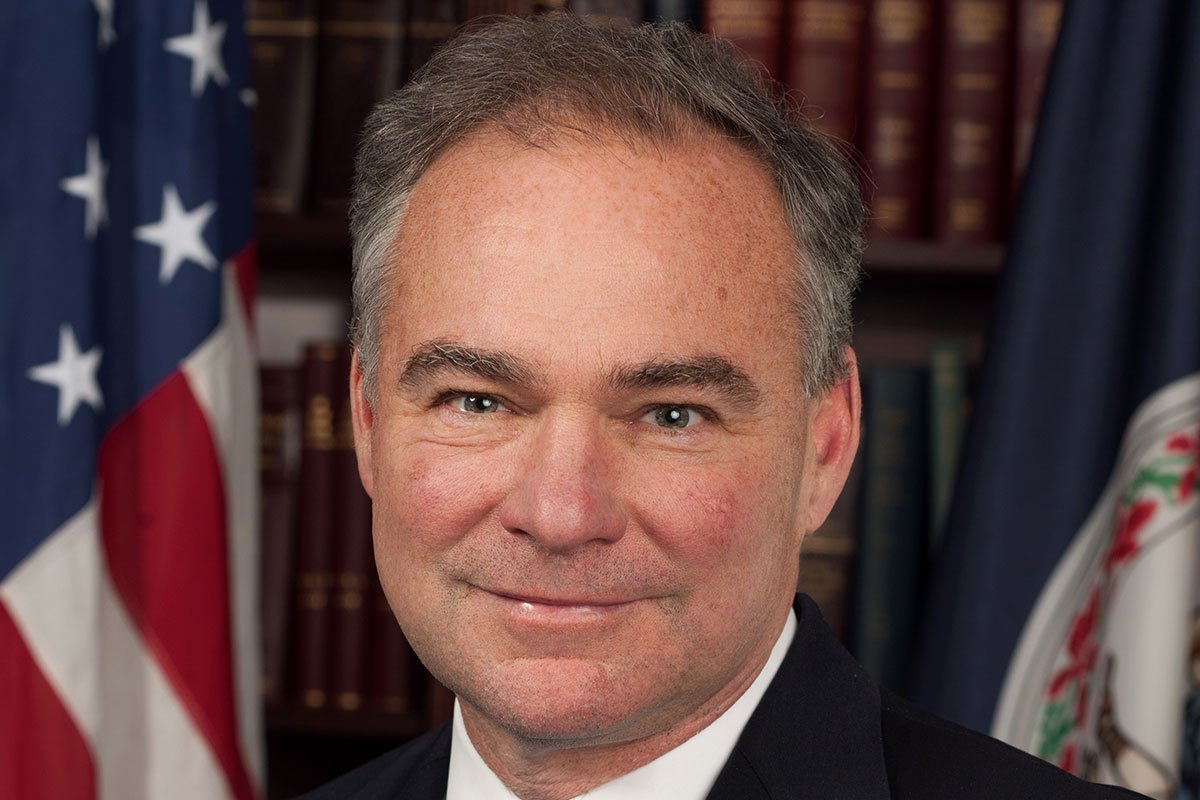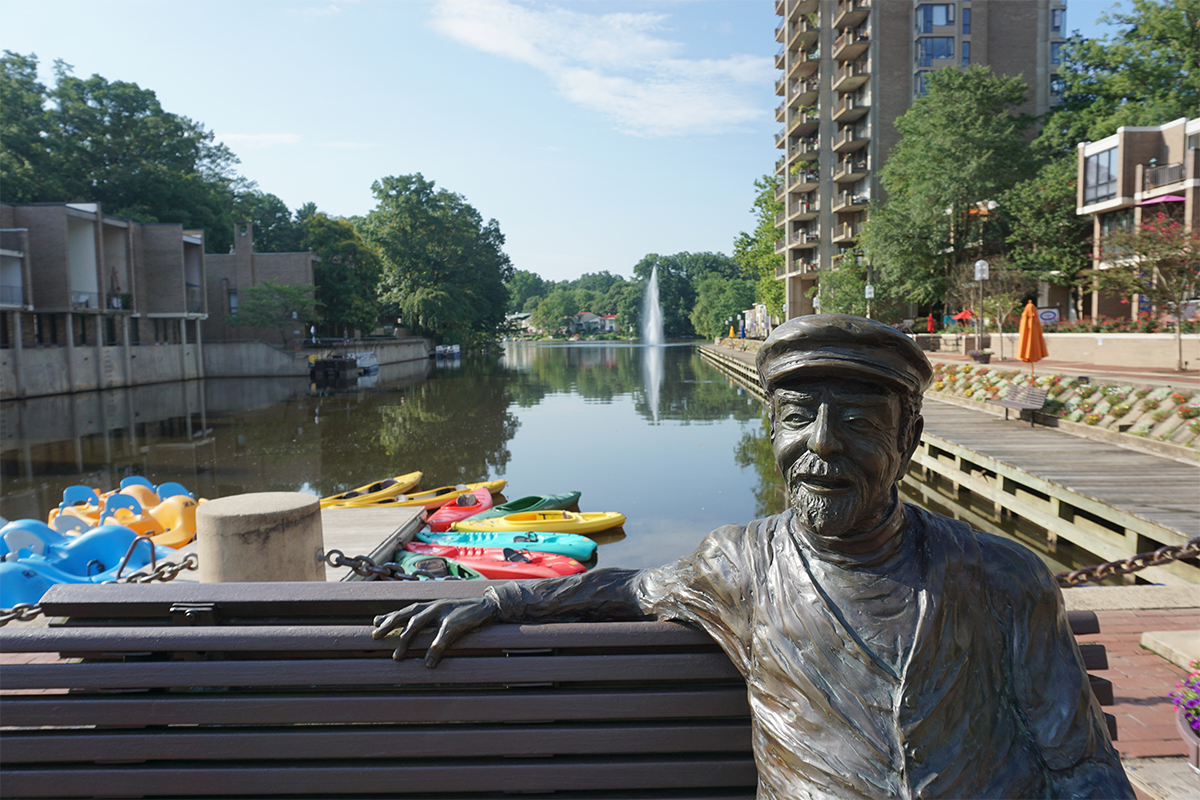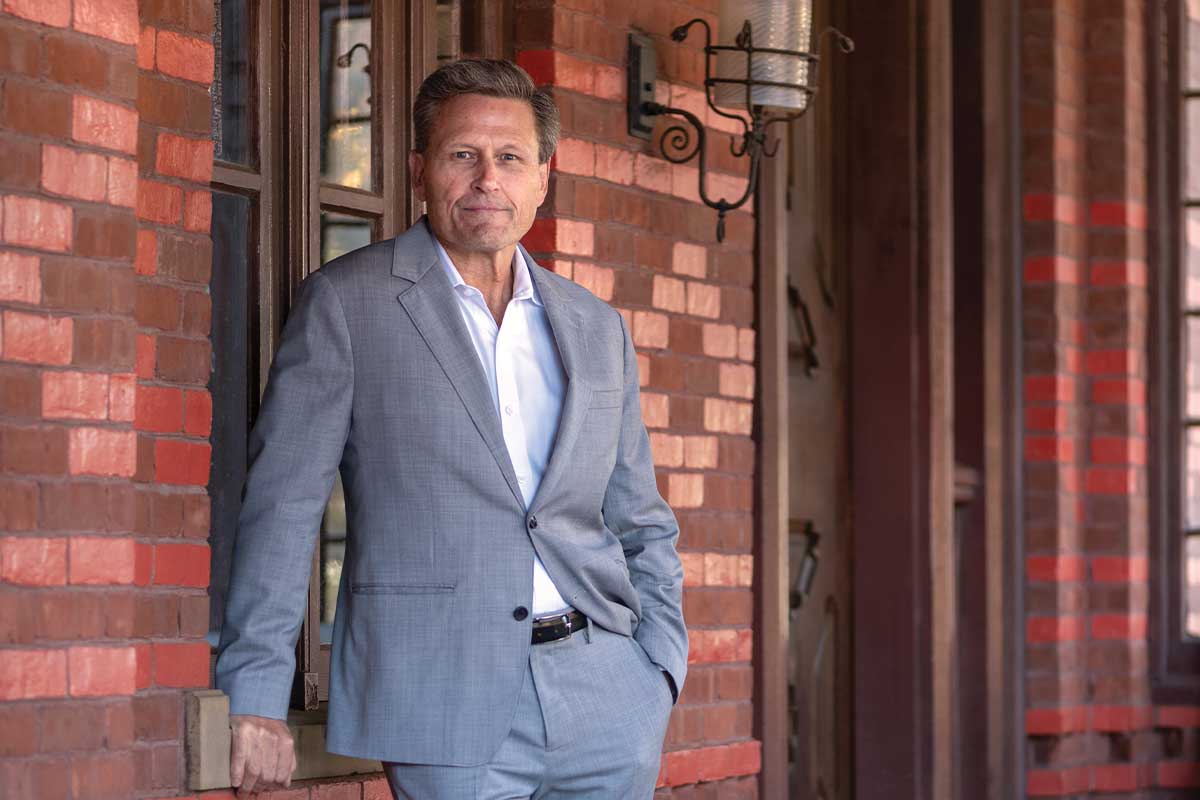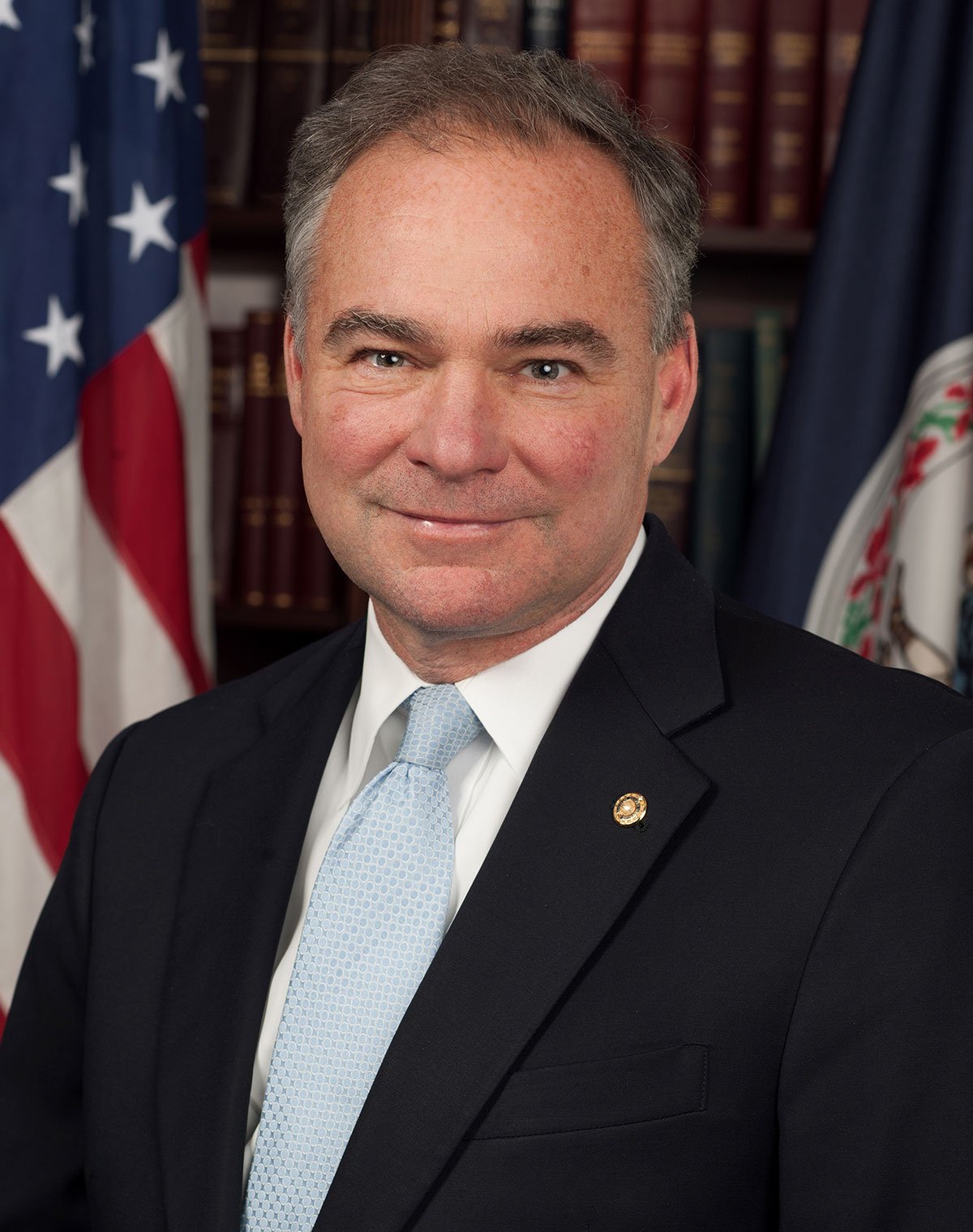
In his second-floor office on Capitol Hill, Sen. Tim Kaine is holding up a drawing that arrived in the mail right after the presidential election of Nov. 8. It features a man with a genial smile and a boldly arched eyebrow. Suspended from the man’s suit jacket is a superhero’s cape emblazoned with the letter “T.” A consolation gift of sorts, the drawing also bears a message: “Be the hero,” it says in neatly formed letters.
The artist, a fourth-grader from Charlottesville named Penelope, included a note expressing her condolences and informing Kaine that she was worried: “‘Dear Mr. Kaine,’” he recalls the letter saying. “‘I’m sorry you’re not the vice president, but you’re still our senator. Can you please stop my classmates from being deported? Can you help protect people who are afraid?’”
Kaine had the picture framed and keeps it within view of his desk. “It gives me motivation every day,” says the senator.
One imagines that for Kaine, 59, a longtime Virginia political leader who had never lost an election, motivation might have suffered a downturn after that unexpected defeat—especially since he and running mate Hillary Clinton had claimed victory in Virginia, a key battleground state, and had won the popular vote by nearly 3 million ballots. How, indeed, did he manage to muster the motivation to report back to work here in the Russell building just one week after a grueling campaign schedule that ended badly? And what has kept him going since?
“Look, I’m human; I was disappointed,” he concedes. “But I’ve loved the Senate since I came in [in 2013], so it hasn’t been hard to enjoy my work.” Joining a new committee—HELP, the committee for health, education, labor and pensions—also served as a boost, he says. The committee would allow him to fight for health care at a critical moment, and education has always been one of his greatest passions.
Then there was the morale boost he gained from the masses who took to the streets the day after the inauguration and from those who later gathered at airports around the country to oppose the president’s immigration ban. “Those weren’t protesters in the traditional sense but welcomers. At Dulles, they were holding up signs saying, ‘Virginia is for lovers,’ and ‘We don’t hate Muslims here,’” he reflects somewhat poignantly.
With a sharpened gaze and his signature raised brow, the senator waxes visionary: “On this 230th anniversary of the Constitution, I think we’re living in a moment when the systems of our country are being tested. Madison, the primary drafter of the Constitution, created checks to protect against an overreaching executive … We all have a role to play to ensure the system is vindicated. The citizens have a role, the press has a role, the courts have a role, and Congress has a role.”
For Kaine, motivation is all about mission, and the senator has always had one.
♦
In a campaign that was not known for its intellectual substance, Kaine’s personal and political attributes were sometimes overshadowed by a label affixed to him the instant he entered the race: boring.
Perhaps that moniker emanated from Kaine’s aura of the everyman—captured sweetly by the wide-eyed fellow in young Penelope’s drawing. No doubt his plainspoken authenticity fed that impression. So did his pushing-60 appearance, often called dadlike (an image belied by a recent 30-mile bike ride and other displays of outdoorsy ruggedness). Last July, an NPR reporter opined: “He might be as exciting as a new pair of flat-front khakis, but he is like a good neighbor. You can imagine Kaine snowblowing your driveway or fixing part of your fence just to be helpful.”
The boring label may also derive from the senator’s life story—successful, scandal-free and remarkably stable. Born in Minnesota and raised in Kansas, the son of a teacher and a welder who owned an iron-working shop, Kaine attended a Jesuit high school and studied economics at the University of Missouri, graduating summa cum laude in three years. He went on to Harvard Law School, where he met his future wife, Anne Holton, who has served as Virginia Secretary of Education and is the daughter of former Virginia Gov. Linwood Holton. Kaine practiced law in Richmond for 17 years, during which time he also won a seat on the city council, serving four terms before being elected mayor in 1998. From there his political hats kept accruing. He became lieutenant governor; governor; Democratic National Committee chair; and, in 2013, senator, a title he hopes to keep after the 2018 election. He serves alongside senior Sen. Mark Warner, a longtime friend who has called Kaine “the most relentlessly optimistic person I’ve ever met.”
Kaine and his wife have been living in the same Richmond neighborhood for the past 32 years and attend the church where they married, a predominantly African-American Catholic parish where he sings in the choir. They have three grown children, all in their 20s—Nat, Woody and Annella.
A Google search of “Tim Kaine” and “boring” yields a plethora of material from last summer, including jabs from late-night comedians. Kaine hardly seemed offended by the label. Throughout the campaign he embraced it, even deadpanning on Meet the Press that boring guys were the “fastest growing demographic in this country.” When Clinton was asked if she considered Kaine boring, she replied, “Yes—I love that about him.”
But not everyone went along with the joke, which may have deepened after Kaine delivered what was widely deemed an awkward performance at last fall’s vice presidential debate, reportedly interrupting Gov. Mike Pence 70 times. At least one person came forward to debunk the notion that Kaine was socially challenged and to refute the arguably more demeaning insinuation that he was little more than a safe pick for Clinton in a race that had grown increasingly contentious.
That person was Beau Cribbs, who had served for two years as Kaine’s personal assistant when he was governor. Cribbs told Politico: “A boring person is someone you would dread getting stuck next to at a party, or someone you wouldn’t want to go on a transatlantic flight with. Tim Kaine can talk to you about anything, and he can talk about it much more eloquently than you could.” Cribbs recounted road trips with Kaine in which the governor indulged his lively command of trivia, especially in the categories of baseball and music, and his spunky sense of humor. Cribbs even recalled an occasion when Kaine joined him in doing stand-up comedy at the Richmond nightclub where Cribbs occasionally performs. Not least, he referenced Kaine’s passion for playing the blues harmonica, noting that the governor always carried several harmonicas in his briefcase.
Indeed one thing that shatters the image of a stuffy politician is the fact that Kaine can walk into a bar and tell jokes or have a jam session with local musicians. He regularly does just that at bluegrass jamborees all around Virginia.
Then there is the senator’s eloquent command of Spanish, which he picked up during a mission trip to Honduras in 1980. He interrupted his studies at Harvard to spend nine months in the impoverished, junta-controlled nation, teaching classes in welding and carpentry, skills he learned from his dad, at a Jesuit-run high school. In return, he says, he acquired not just a new language but a vast appreciation for American democracy and public service. To hear Kaine deliberate in Spanish, as he did in the first-ever speech of its kind on the Senate floor in 2013, is to witness his embrace of diversity and outreach. (Consistent with that, he has advocated what he sees as a humane immigration policy that includes protecting the border and implementing a long-term, tightly regulated path to citizenship.)
If there is anything boring about Kaine, it may be his moderate governing style. He has generally embraced an incremental approach when pushing for policy changes, avoiding the revolutionary style of Democratic firebrands like Sens. Bernie Sanders and Elizabeth Warren. It’s a style that matches his even-keeled temper. According to Cribbs, “He never gets too high or too low when things are going well or not so well. He’s got a very steady hand, and he was that way the whole time I worked for him.” Kaine’s cool pragmatism has been compared to that of Barack Obama, whom he counts as a close friend.
Anyone who has listened to Kaine expound the latest issues—during his regular Q&A sessions on WTOP radio, for instance—might concur with Cribbs’ final assessment: “He’s a lot more politically savvy than you might think, and he makes really strategic decisions. He comes off as Mr. Nice Guy, and he is a nice guy … but it’s not like he’s Mr. Rogers.” (No disrespect to Mr. Rogers, Cribbs insisted.)
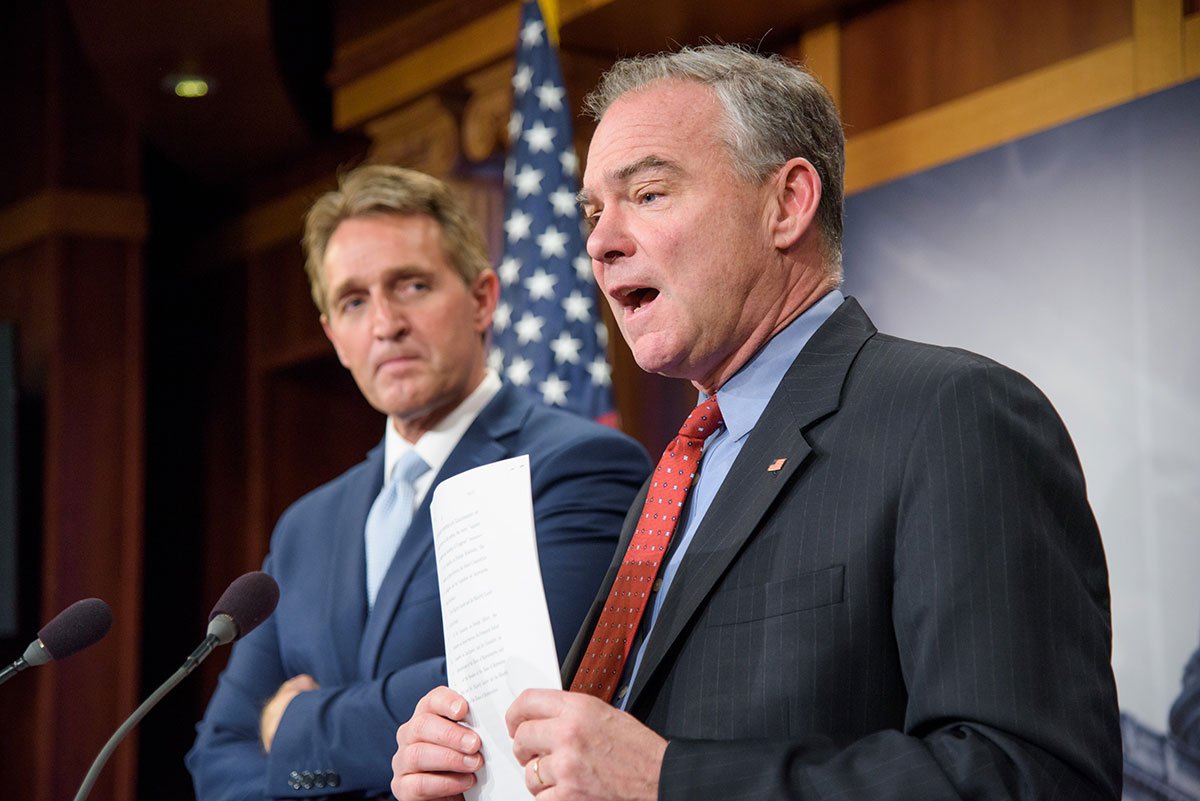
During the vice presidential debate, Donald Trump offered his own depiction of the Democratic nominee: “Kaine looks like an evil crook out of the Batman movies,” the future president tweeted.
It was not an election season that will be remembered for its intellectual substance. Or civility.
Ultimately, the caricatures obscured not only the senator’s savvy and spunk but also the spiritual dimension that has always been intrinsic to his personal and political identity. Virginia’s first Catholic governor, Kaine has long professed faith to be the North Star of his life’s journey, inspiring a brand of statesmanship centered on social justice—what he calls the “Good Samaritan position.” As he told the New Yorker last year, the role demands abiding in essential questions: “Who’s beaten up and lying on the side of the road now? Is it somebody in an immigration detention camp? Is it an LGBT kid who’s going to a high school … but feeling like the governor of their state is kicking them around?” In last summer’s DNC speech, Kaine channeled the spirit of the civil rights movement by invoking the “beloved community,” a term popularized by Martin Luther King Jr. (and still frequently employed by King’s iconic disciple, Rep. John Lewis of Georgia).
Naturally, some have questioned the authenticity of Kaine’s convictions—par for any political course—especially when his position on social issues is nuanced or clashes with Catholic orthodoxy. He has long professed personal opposition to abortion while upholding the belief that reproductive decisions should rest in the domain of personal conscience. As governor, he sparked rebuke from abortion rights advocates when he signed a law approving “Choose Life” license plates, whose proceeds funded clinics that counseled women to reject abortion. Kaine defended the plates as free speech. But he has also wrangled with those who’ve tried to make abortion less accessible. He opposed the nomination of Neil Gorsuch to the Supreme Court largely over concerns about Gorsuch’s record of “an activist approach” to issues related to reproduction.
Skeptics notwithstanding, Kaine’s Samaritanism predates his political career. As a 20-something rookie attorney, his first assignment was a pro bono case involving a black woman confronting an entrenched system of housing discrimination in Richmond. Her ordeal began when she went to see an apartment and was told it had already been rented. Later that day, when she had a friend call to inquire about it, the unit was suddenly available, suggesting an obvious case of discrimination. Kaine’s easy victory in the suit set him down a path. Civil rights cases would eventually occupy the majority of his workload, culminating in a 1998 landmark verdict against Nationwide Insurance for discriminatory lending practices.
♦
Asked to reflect on his proudest achievements as an elected official, Kaine is quick to reference Virginia’s achievements: “In 1994 (the year he entered politics), Virginia was not a leader. But 23 years later, Virginia is economically much more dynamic and socially more inclusive. People pay attention to what happens in Virginia.” (Proof positive: Between 1840 and 2016, there was never a Virginia leader on a presidential election ticket, he points out.) He calls himself a “hard times governor” for having steered the commonwealth through the worst fiscal crisis since the Great Depression after the housing market collapsed in 2008. The governor managed to slash the state’s budget by more than $4 billion.
But the hardest time came in the wake of April 16, 2007—the day a depraved student named Seung-Hui Cho burst into a classroom and opened fire at Virginia Tech. Kaine cut short a business trip to Japan and headed to Blacksburg, reaching out to a devastated community and the heartbroken families of the victims—32 dead and 17 injured. He swiftly issued executive orders aimed at repairing the faulty communications that had allowed Cho to legally purchase his guns despite having been adjudicated as mentally ill. The governor also commissioned a panel to formulate crisis plans that have been in place in Virginia schools and colleges ever since. In the decade since the tragedy, Kaine, a gun owner and avowed defender of the Second Amendment, has issued impassioned pleas to Congress for expanding background checks and has assailed the gun lobby for continually working to block legislation that the vast majority of Americans—including, he points out, the vast majority of NRA members—strongly support.
♦
On a Monday afternoon in late March, Kaine is making his rounds in Northern Virginia, engaging the grassroots. His first stop is Kettle Run High School in Nokesville, where he addresses an auditorium of government students, many eager to ask questions and pose at his side for a selfie. Kaine is hardly boring as he expounds hot-button issues—climate change, immigration, social security and more—relevant to their study of the three branches of government. It’s no surprise that the senator has taught classes at the University of Richmond or that he professes a passion for education. His ruminations are lively, lucid and richly grounded in American history.
One student asks about the elephant in the room: How did he deal with that stunning election loss? Should the Electoral College be abolished? Kaine responds with a line from the Serenity Prayer—the one that invokes “wisdom to know the difference” between what can and can’t be changed. With a laugh, he finds a teachable moment, explaining the enormous challenges involved in amending the Constitution.
Kaine doesn’t flinch when questions are potentially sensitive: Does he like Hillary Clinton? He and Anne felt privileged for the chance to get to know her, he replies. He also cites 17 separate polls indicating that Clinton, before seeking the presidency, was one of the most admired women in America.
Did he support any of President Trump’s cabinet picks? He actually voted yes for many of them, he replies. Gen. James Mattis was one. “But I couldn’t approve anyone who doesn’t support science,” he says unequivocally. While he doesn’t mention it here, he also couldn’t support Betsy DeVos, Trump’s controversial pick for education secretary. At a confirmation grilling that was widely cheered by public educators, Kaine pressed the nominee about her qualifications, or what many deemed a lack thereof, and prospective policies for private schools receiving public monies through vouchers. Should they be held to the same standards as public schools, and should they have to comply with federal laws like the Individual with Disabilities in Education Act? DeVos repeatedly demurred. Each time, Kaine’s retort was swift: “I’ll take that as a no.”
From Nokesville, Kaine and his team head north on I-95 to the King Street Metro in Alexandria, where he’ll ride the rails with Washington Metropolitan Area Transit Authority General Manager Paul Wiedefeld, followed by a visit to the National Cybersecurity and Communications Integration Center in Arlington. As a member of the Senate Budget Committee, he’s decried massive proposed cuts that could sideline local infrastructure projects and compromise national security. He’s also condemned what he sees as the Trump administration’s demonization of federal workers, which include 170,000 Virginians.
When it comes to protecting men and women in uniform, the matter is personal: Kaine’s oldest child, Nat, is an active-duty Marine. As a member of the Foreign Relations Committee, Kaine has repeatedly urged policies requiring Congressional approval for the use of military force—something he championed under Obama and continues to press for under Trump.
Kaine also urges measures to protect democracy itself. In a March interview with Katie Couric, he opined that White House allegations of foul play on the part of the Obama administration—including Trump’s charge that Obama himself had conducted a “tap” of Trump Tower—constitute an orchestrated effort to distract the American public from critical questions about a Russian cyberattack on the presidential election and whether the Trump campaign colluded in that attack.
Back in his office, Kaine is once again waxing visionary. Does he believe the nation will overcome what he’s described as a test of its Constitutional principles? “I do,” he replies. His relentless optimism, underscored by that bold brow, is palpable. “I believe we’ll see some short-term losses, but in the end, if we all do our part, I think the system will be vindicated.”
Will he ever run again on a national ticket?
“You know, things happen for a reason. I haven’t completely determined the grand plan from the result of the election, but one piece of it is that I’m supposed to be in the Senate—I’m supposed to be a good senator.”

